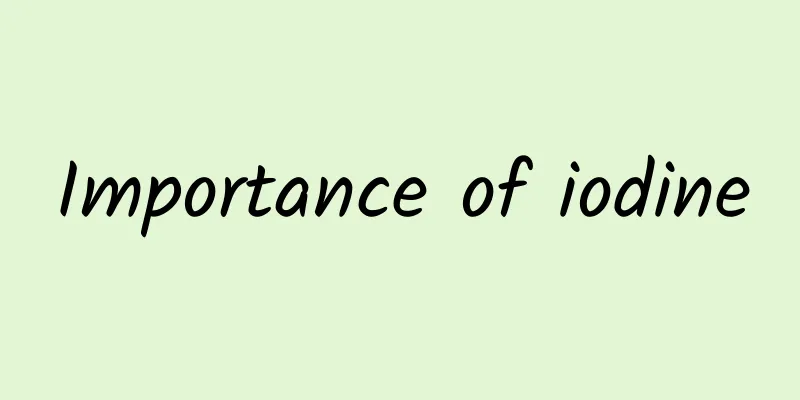Importance of iodine

|
May 15th is the National Iodine Deficiency Disease Prevention and Control Day. Iodine is a micronutrient necessary for metabolism and growth and development, and is the main raw material for the synthesis of thyroid hormones by the human body. Its importance to the human body is self-evident. What are the symptoms and hazards of iodine deficiency? How to effectively prevent it? Let's learn about it together. Iodine exists in the human body as a nutrient like protein, fat, sugar, vitamins, etc., and is known as the "intelligence element". Although its content in the human body is only 20-50 mg (average 30 mg), it is a health guarantee for maintaining normal thyroid function, promoting metabolic processes, maintaining normal growth and development of the body, and maintaining normal nervous system function and intellectual development. Iodine deficiency can cause iodine-deficiency goiter, which is what we often call "big neck disease". Dangers of iodine deficiency: 1. Iodine deficiency during the fetal period. All the iodine needed by the fetus comes from the mother. If there is severe iodine deficiency during pregnancy, miscarriage, premature birth, stillbirth and congenital malformations may occur. 2. Iodine deficiency in the neonatal period will affect the normal development of the brain and may cause problems such as subclinical disease, intellectual disability, deafness, and growth and development disorders. 3. Iodine deficiency in children and adolescents can cause goiter, simple deafness, intellectual impairment and growth and development problems in children. 4. Iodine deficiency in adulthood can cause goiter, hypothyroidism, fatigue, lack of concentration and decreased work efficiency. The main symptoms of iodine deficiency are: The iodine intake of the human body is obtained from water and animal foods. There are obvious regional differences in iodine, which affects the level of human intake. Iodine deficiency disease occurs when the external environment lacks iodine, resulting in insufficient iodine intake in the human body. A general term for a series of diseases: 1. Endemic goiter: It refers to the enlargement of the thyroid gland to varying degrees, with the neck becoming thicker and in severe cases, difficulty breathing and swallowing may occur. 2. Endemic cretinism: refers to mental retardation, deaf-muteness, growth retardation, motor nerve dysfunction, spastic paralysis of the lower limbs, and symptoms of hypothyroidism (myxedema, slow reaction, drowsiness, lack of energy, fear of cold, and low appetite). 3. Subclinical tingling disease: refers to mild intellectual disability, mild hearing and language impairment, mild neuromotor disorder, mild physical development retardation, and hormonal hypothyroidism. How to supplement iodine scientifically: To prevent the above diseases, the best way is to consume iodized salt. Consuming iodized salt is not only safe, effective, and easy to promote, but also conforms to the principle of trace, long-term, and daily iodine supplementation. Of course, the more iodine you consume in iodized salt, the better. In daily life, you need to control your salt intake, and it should not exceed 6 grams per day. The World Health Organization recommends that adults consume 150-3300 micrograms of iodine per day. In addition to consuming iodized salt, you can also eat more kelp, jellyfish, seaweed, seaweed, spinach, celery and other foods to supplement iodine in your daily life. Moreover, iodine supplementation cannot be generalized for different groups of people, and you need to use "addition and subtraction" skillfully. These groups need to be “added” 1. Pregnant women: Pregnant women should ensure that their daily iodine intake is 200-300 micrograms. 2. Infants and young children: Iodine supplementation is most important before the age of three. 3. Adolescents: During the period of physical development and accelerated metabolism, the need for iodine supplementation is greater. These people need to do "subtraction" 1. Residents in high iodine areas The daily iodine intake of residents in high-iodine areas in my country is above 800-1000 micrograms, so there is no need for iodine supplementation. Excessive iodine intake can easily cause hyperthyroidism, thyroid tumors, thyroiditis, thyroid cysts, etc. 2. Hyperthyroidism patients Patients with autoimmune thyroid diseases (common ones include hyperthyroidism, thyroiditis, etc.) do not need to consume or consume less iodized salt according to the doctor's advice due to treatment needs. |
<<: “Guide to Eating Out Safely” Series: Will your stomach agree to eating barbecue?
>>: What should I do if my child has an upper respiratory tract infection?
Recommend
Shareaholic: Pinterest surpassed Yahoo to become the fourth largest source of organic traffic in August 2012
Pinterest has surpassed Yahoo to become the fourt...
Can I get pregnant during my period?
Female pregnancy is the combination of sperm and ...
Can I eat carambola during menstruation?
The significance of diet to us humans has long ce...
What to do if you are very fat during late pregnancy
Most people have a misconception about maternal o...
Why do I have lower abdominal cramps, dizziness, chest tightness, and leg pain after abortion?
Everyone knows what "ripe melons fall off th...
IDC: Global smartphone shipments in Q1 2024 increased 7.8% year-on-year to 289.4 million units
According to recent news, Lei Jun, founder, chair...
Can I do breast enhancement yoga during menstruation?
Many women know that yoga has many benefits. Yoga...
Will it be too cold to apply lotion during confinement?
I believe everyone knows that for a woman who has...
Pharmacist's Antidote | For autumn and winter asthma, use theophylline safely and effectively, you need to know these key points!
Autumn and winter are the peak seasons for respir...
What to do if you are infertile after IUD removal
The family planning policy in our country is stri...
How can girls exercise to lose weight?
Having a pair of long and beautiful legs is what ...
Why is it easy to get pelvic inflammatory disease after childbirth?
I believe everyone knows the importance of the pe...
Can acute pelvic inflammatory disease be cured?
Acute pelvic inflammation develops rapidly, so re...
Can breast cancer cause back pain?
Breast cancer can be said to be a very painful di...
If you have a newborn baby at home, what should you do if it is positive? You must know these 6 points
If you have a newborn baby who is less than 28 da...









